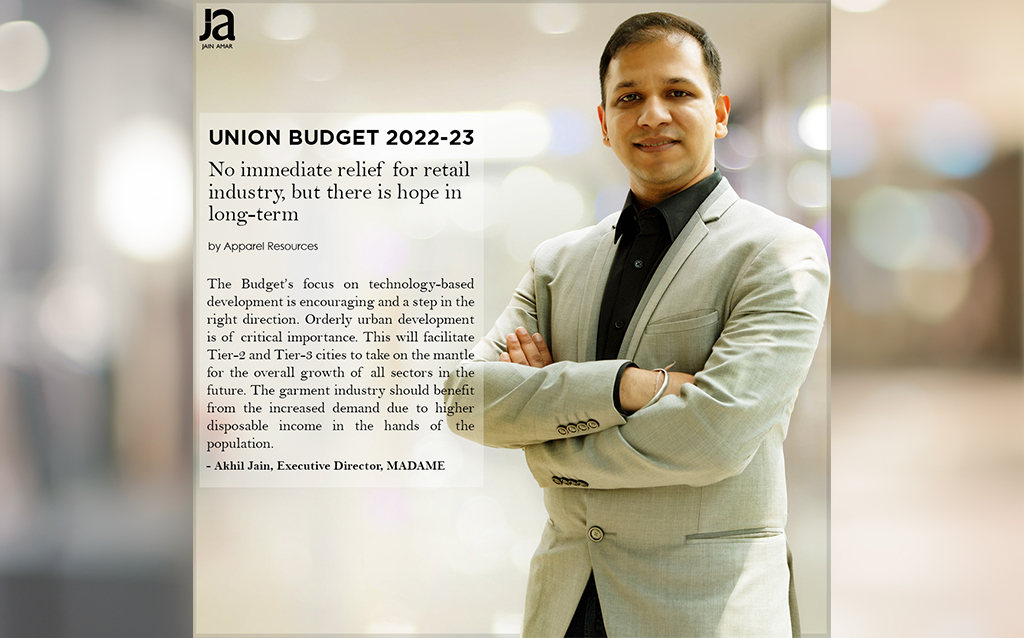
While the retail sector, one of the worst hit during the pandemic, was hoping for reforms that would uplift consumer sentiment, Budget 2022 lacked direct support for consumption. Though the Budget has long-term benefits for the retail sector, there is no immediate relief.
Union Minister Nirmala Sitharaman on Tuesday presented the Union Budget and with the ongoing pandemic and its effects on businesses and economy, the Finance Minister continued to give priority to growth over fiscal consolidation for the second year. The Government expanded the capital and infrastructure spending in the Budget for the year starting April 01. The Budget has stepped up the capital expenditure sharply by 35.4 per cent to Rs 7.50 lakh crore to attract more private investment. Being ‘a growth-oriented Budget’, it focuses on 4 pillars – productivity, climate action, financing investments and PM Gati Shakti plan.
While the retail sector, one of the worst hit during the pandemic, was hoping for reforms that would uplift consumer sentiment, Budget 2022 lacked direct support for consumption. The Union Budget has no relief for the salaried and middle-class as it doesn’t propose any changes in personal income tax rates for the next fiscal. However, the Government’s capex boost will have a multiplier impact on the growth. Also, investments in the core sectors are expected to lead to greater demand across industries, push up the capacity utilisation rates and consequential private capex, create more jobs and through higher incomes, reinforce greater consumption and demand. The Budget has made various announcements that would bring in more jobs going forward. Also, the allocation of Rs 2.37 lakh crore for minimum support price payout to wheat and paddy farmers will increase spending power of rural consumers.
Further, start-ups too have something to celebrate. The Finance Minister has announced that eligible start-ups, established before March 31, 2022, will be provided with a tax incentive for three consecutive years out of ten years from incorporation. The tax incentive from the period of incorporation has been extended by an additional year.
Overall, though the Budget has long-term benefits for the retail sector, there is no immediate relief. Here are the industry’s viewpoints on Budget 2022:
Kumar Rajagopalan, CEO, Retailers Association of India
The Budget 2022 seems to have a thrust on infrastructure development, digitisation, skilling, and ease of doing business, which will impact retail in the long-term. The emphasis on ‘Ease of Doing Business 2.0’, should bring a better policy and regulatory environment for retail; on this front, work on a National Retail Policy is already underway.
Ramesh Kapoor, Chief Financial Officer, Numero Uno
This is very good growth-oriented balanced budget. The Government has kept election politics away from Budget which is a wonderful approach. There are no freebies. Emphasis on Atmanirbhar and ‘Make in India’ will open lot of opportunities for domestic industry. ECLGS (Emergency Credit Line Guarantee Scheme) to be extended upto March 2023, will help MSMEs. Also, Rs. 2 trillion outlay for MSMEs, additional loan of Rs. 13 million to MSMEs will help in meeting working capital needs. Surcharge on corporate tax reduced from 12 per cent to 7 per cent will help domestic companies.
Akhil Jain, Executive Director, Madame
The Budget’s focus on technology-based development is encouraging and a step in the right direction. Orderly urban development is of critical importance. This will facilitate Tier-2 and Tier-3 cities to take on the mantle for the overall growth of all sectors in the future. The garment industry should benefit from the increased demand due to higher disposable income in the hands of the population.
Veena Ashiya, Founder and CEO, Monrow
The global pandemic has put tremendous strain on start-ups, small and medium-sized businesses, but for the businesses that embraced e-commerce, the omnichannel approach and digital payments have thrived well. The Finance Minister has laid emphasis on the digitalisation of business and given the necessary boost to small businesses, start-ups and MSMEs. The Government will extend tax incentives for start-ups up to March 2023. This will benefit start-ups and small businesses that have been affected by the third wave to lay a foundation for a profitable quarter.
Purvi Rohit Pugalia-Co-Founder, Not So Pink
The Budget has been extensively focused on start-ups and digital push which is a great thing for the e-commerce sector. Since many retail players started in the post-pandemic period and have sizeable operations in the digital medium, this opens up new requirements for digital skills and expertise. API-based skill credentials, secure payment layers for jobs and the upcoming digital upskilling programme will help empower company owners as well as those looking for opportunities to be more relevant in the current climate.
Kapil Makhija, CEO, Unicommerce
The budget’s elaborate focus on building digital economy and technology-enabled development is extremely encouraging. As mentioned during the Budget that start-ups have emerged as growth drivers for our economy showcases the immense potential of India’s start-up ecosystem. It’s evident that the Government’s push on 5G, connectivity and logistics will help the e-commerce industry to develop and grow further. Technology will be a key enabler here leading to improve logistics and ensure faster deliveries. We are excited to see this growth journey and are extremely optimistic about the future. We look forward to continue to partner with the ecosystem players and simplify e-commerce selling with our technology solutions that will support the nation’s growth objectives, generate employment and strengthen India’s digital economy.
Post budget comment from Mr. Akhil Jain, Executive Director, Madame, a Retail brand:
‘’National Technical Textile Mission with an outlay of Rs 1,480 crore is a great move by Finance Minister. The bigger chunk of this investment must be utilised for skill development, tech and automation to get higher efficiency for faster and cost effective produce. We are really happy about the personal income tax reduction in the budget, which should add positive sentiments overall and spur the consumer towards spending that was on hold in the previous 2-3 years’’ says Akhil Jain, Executive Director, Madame, a Retail brand.
